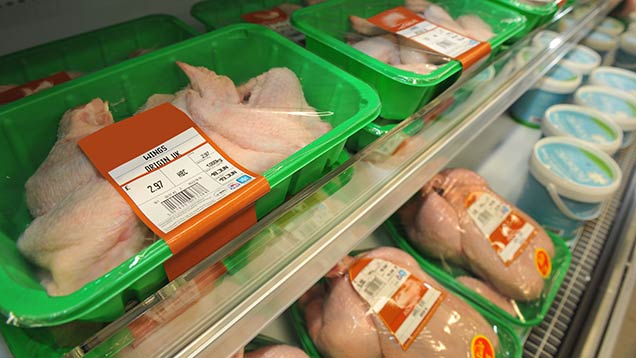Cheap chicken policy ‘contributes to campylobacter risk’
 © Paula Solloway/REX Shutterstock
© Paula Solloway/REX Shutterstock Competitive retail chicken prices are putting people at risk from outbreaks of campylobacter, according to a leading food safety expert.
Professor Chris Elliott, who conducted the UK government’s inquiry into the 2013 horsemeat scandal, said the ongoing retail price war is discouraging investments to help reduce campylobacter contamination.
Prof Elliott, director of institute, Food Safety and Microbiology at Queen’s University, Belfast, said UK broiler producers could limit the incidence of campylobacter by not “thinning” their flocks – a practice he says would cost about 10p/bird.
See also: 4 ways to cut campy on UK farms
But supermarkets, he argued in an interview with The Times, were not prepared to pay the additional price, resulting in greater risks to consumers.
Research has shown that each time catching teams go in to thin a flock, campylobacter present in the faeces is spread to other healthy birds, raising the number of contaminated birds being sent to processors.
“Zero thinning is certainly one of the solutions,” said Prof Elliott. “It would cost 10p more a carcass, but there is a greater reluctance among retailers to pass on any cost now, because they are engaged in a price war.”
Surveys by the Food Standards Agency have shown 73% of whole chickens sold in Britain’s major supermarkets are contaminated with campylobacter. It is the major source of food poisoning in the UK, with about 280,000 human cases a year and 100 related deaths.
An FSA spokesman said it was vital that retailers and processors should do as much as possible to make sure chickens were safe before reaching the consumer.
“The results from non-thinned flocks are promising,” he said. “But campylobacter is present throughout the environment and the colonisation of a flock can occur regardless of size. However, on farm a combination of no thinning and tight biosecurity is the key to having negative flocks.”
Some supermarkets, such as Marks and Spencer’s and Waitrose, have already stopped their farms from using thinning for their whole roast birds.
